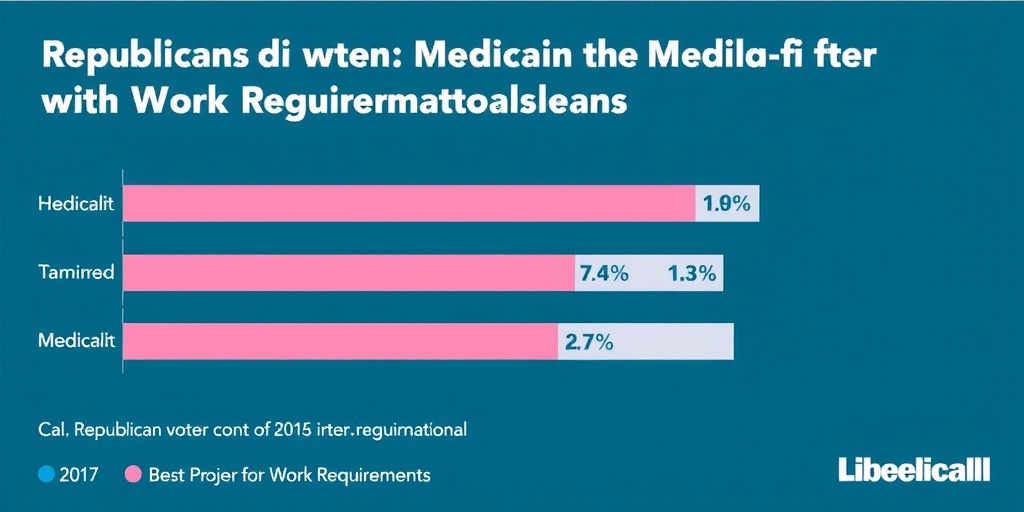Now Reading: Poll: Republican Voters Favor Medicaid with Work Requirements
-
01
Poll: Republican Voters Favor Medicaid with Work Requirements
Poll: Republican Voters Favor Medicaid with Work Requirements

Poll Reveals Strong Opposition to Medicaid Cuts Among Voters Despite Support for Work Requirements
As Congressional Republicans deliberate potential substantial cuts to Medicaid, a recent poll from KFF, a nonpartisan health research organization, shows a prevailing sentiment among voters opposing any reduction in funding for the public health plan. The survey, released on a Friday, indicates that a mere 17 percent of respondents favor cuts to Medicaid, which is the government health insurance program that currently serves over 70 million individuals. The findings reveal that 40 percent of those surveyed prefer maintaining current spending levels, while 42 percent are in favor of increasing the program’s funding.
Despite this strong opposition to cuts, the poll unearthed significant backing for policies that could limit Medicaid’s reach, particularly the introduction of work requirements for enrollees. More than 60 percent of voters, including 47 percent of Democrats, expressed support for this stipulation, showing a complex attitude towards reforming the program without outright abandoning it.
Proponents in Congress believe that implementing work requirements could lead to an estimated $100 billion reduction in Medicaid spending. This reduction hinges on the assumption that individuals who are unemployed, or those unable to submit verification of their employment status, would lose their coverage. Medicaid’s projected cost for 2024 is approximately $584 billion, constituting about 8 percent of total federal spending.
Additionally, the poll illustrated the extensive reach of Medicaid in American lives, with over half of the respondents acknowledging that they or a family member have benefited from Medicaid at some point. A staggering 98 percent of Democrats and 94 percent of Republicans agree that Medicaid plays a critical role in their local communities, highlighting its importance across the political spectrum.
Republican members of Congress are contemplating several modifications to Medicaid in light of fiscal pressures stemming from President Trump’s tax cuts. Recently, the House passed a budget that, if ratified by the Senate and signed into law, could potentially sever up to $880 billion from Medicaid over the next decade. This financial strategy might be executed through work requirements, instituting caps on federal spending for the program, or revising the federal cost-sharing arrangement.
Notably, even though a majority of poll respondents showed support for work requirements, misconceptions about the demographics of Medicaid enrollees persist. Around 62 percent of voters mistakenly believe that most Medicaid recipients are unemployed, a belief contradicted by data indicating that most enrollees are, in fact, employed.
Interestingly, Republican voters exhibited a willingness to consider funding reductions for the Affordable Care Act’s Medicaid expansion, which currently receives a substantial federal contribution covering 90 percent of costs for participants—typically healthier adults—as opposed to other enrollees like children or those with disabilities. In the poll, 64 percent of Republican voters and 40 percent of the overall respondents indicated they would support diminishing the federal government’s share for Medicaid expansion.
However, perspectives on this reduction appeared to be flexible when additional context was provided. When informed that millions could lose coverage under such changes, support from Republicans dropped significantly to 43 percent. Conversely, when respondents learned that the modifications could result in approximately $600 billion in federal spending cuts, support surged to 73 percent.
This shifting support reflects an ongoing trend seen during the debates surrounding the Affordable Care Act repeal in 2017, where attempts to roll back Medicaid were met with significant political resistance primarily due to public apprehension about cuts to the program. At that time, a similar poll demonstrated that 70 percent of voters supported work requirements while only 36 percent favored cuts to Medicaid expansion funding.
KFF’s executive director of survey research, Mollyann Brodie, stated, “Medicaid is a very popular program among a wide swath of the public, including Republicans.” However, she cautioned that “opinions could be quickly moved in the context of debate where people learn more information and feel their coverage is threatened.”
As discussions continue in Congress regarding Medicaid funding and eligibility requirements, the divergence between general support for the program and the backing for specific limiting policies illustrates the complexity of public opinion. As Republicans move forward with their budgetary plans, the results of this poll underscore the need for careful navigation of voter sentiments to mitigate potential backlash against Medicaid reform.
Stay Informed With the Latest & Most Important News
Previous Post
Next Post
-
 01New technology breakthrough has everyone talking right now
01New technology breakthrough has everyone talking right now -
 02Unbelievable life hack everyone needs to try today
02Unbelievable life hack everyone needs to try today -
 03Fascinating discovery found buried deep beneath the ocean
03Fascinating discovery found buried deep beneath the ocean -
 04Man invents genius device that solves everyday problems
04Man invents genius device that solves everyday problems -
 05Shocking discovery that changes what we know forever
05Shocking discovery that changes what we know forever -
 06Internet goes wild over celebrity’s unexpected fashion choice
06Internet goes wild over celebrity’s unexpected fashion choice -
 07Rare animal sighting stuns scientists and wildlife lovers
07Rare animal sighting stuns scientists and wildlife lovers





















